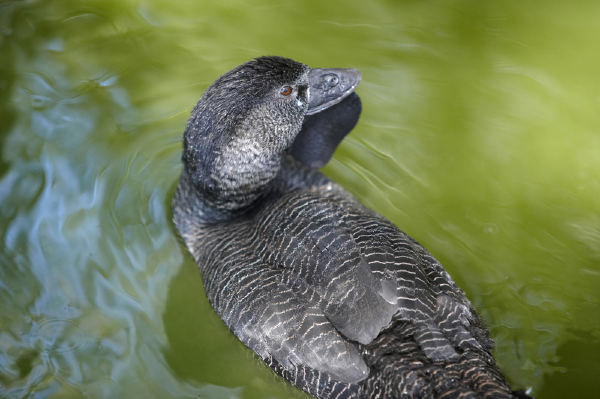Don't miss the latest stories
‘You Bloody Fool,’ Cusses First-Ever Duck Recorded To Have Spoken
By Mikelle Leow, 07 Sep 2021
Subscribe to newsletter
Like us on Facebook

Photo 43260869 © Thomas Samantzis | Dreamstime.com
Famous first words include “Mama” and “Papa.” Ripper the duck was several steps ahead: he swore.
Speaking clearer than Donald Duck, Ripper, an Australian musk duck (Biziura lobate), had the mouth of a sailor. Unfortunately, he’s no longer alive, but biologists have saved audio files as part of research documenting the first scientifically approved case to prove that ducks can have vocal training.
The words he picked up were “you bloody fool,” of course. Pretty badass for the first waterfowl to have been recorded to imitate sounds.
Male Australian musk ducks like Ripper perform displays in front of females to prove themselves as ideal suitors and to intimidate rivals, IFLScience notes. Apart from non-verbal acts like a “paddle-kick” and “plonk-kicks,” they also engage in “whistle-kicks,” where they produce soft, low-frequency sounds and louder whistles alongside kicks. With humanlike speech as part of his whistle-kick moves, who knows how much Ripper scored?
And he could beatbox too, sort of. Audio uploaded by ScienceAlert, recorded by ornithologist Peter Fullagar, document Ripper imitating a slamming door.
In the paper, published in the Philosophical Transactions of the Royal Society B scientific journal, researchers Carel ten Cate, from the Leiden University, and Peter Fullagar detailed that acquiring vocalizations by learning from surroundings “is only known from a limited number of animal groups.” In the winged field, these include songbirds, hummingbirds, and parrots.
It is believed that Ripper learned his smutty catchphrase from his keeper at the Tidbinbilla Nature Reserve South West in Canberra in the 80s, who probably said the line frequently enough for the waterfowl to parrot it, although it sounds more like “You bloody foo…”
15 years after Ripper, another male duck at Tidbinbilla was recorded sounding like a duck of another species. This time around, the duck was reared by a female duck in captivity instead of a human keeper.
The discoveries could be critical to studying the origins of vocal learning. “Some songbirds imitate more and better than others… To understand how vocal learning started, we need to know the ancestral trait,” said ten Cate. “That evolved long ago under conditions we can’t determine.”
The team believes that musk ducks evolved into learning vocally “much more recently.”
“We can look at them and related species [that can’t learn vocally] and work out what the differences are,” ten Cate added.
One theory is that Australian musk ducks are more institutionalized than some other waterfowl. Ripper, who hatched in 1983, was raised by hand.
Meanwhile, our attempts at cursing through our phones autocorrect themselves to “duck.”
[via IFLScience and ScienceAlert, cover photo 43260869 © Thomas Samantzis | Dreamstime.com]
Receive interesting stories like this one in your inbox
Also check out these recent news





